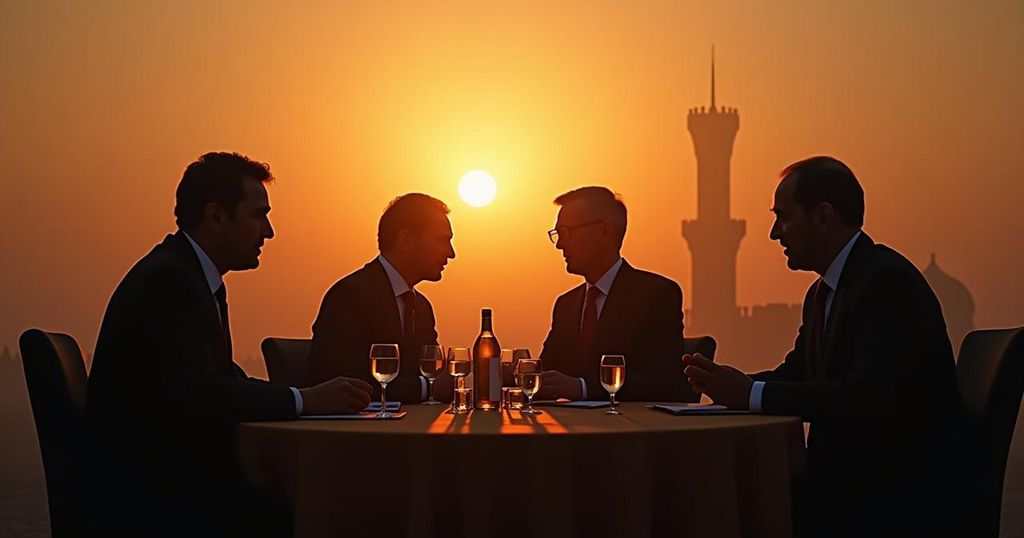Qatar’s Diplomatic Balancing Act: Mediating Amidst Regional Turmoil

Qatar serves as a crucial mediator in the Middle East, particularly regarding the Gaza conflict, maintaining relationships with Hamas, Israel, and the United States. Despite recent escalations, Qatar continues its diplomatic efforts and humanitarian aid initiatives, striving to navigate complex regional dynamics while ensuring its survival amid a precarious geopolitical landscape.
Qatar’s unique positioning in the Middle East landscape has placed it in a critical role as both a mediator and ally to conflicting powers, particularly in the ongoing crises stemming from the Gaza conflict. With established relationships with Hamas, Israel, and the United States, Qatar has skillfully navigated the complex terrain of regional diplomacy, especially following the recent escalations. The mediation efforts witnessed in the past year reflect a deeper historical trend rooted in Qatar’s diplomatic strategy that began with the leadership transition in 1995 and the subsequent establishment of Al Jazeera. Under the leadership of Sheikh Hamad bin Khalifa Al Thani, Qatar transformed itself from a small Gulf state into a prominent diplomatic player. Its unique approach—engaging with all parties involved in conflicts—has proven essential, as articulated by Dr. Mehran Kamrava of Georgetown University, who remarked, “Qatar learned early that engaging with all sides — whether in conflict or diplomacy — was essential for its long-term survival and relevance.” Qatar’s financial assistance to Gaza, particularly its billions allocated since 2018 for humanitarian support under Hamas, was part of an arrangement with Israel aimed at maintaining stability in the region. However, following the attacks initiated by Hamas on October 7, 2023, concerns regarding Qatar’s ongoing financial contributions have emerged. This development complicates Qatar’s role, yet it remains a pivotal mediator. Taufiq Rahim, a senior fellow at New America, noted, “While the landscape has shifted significantly, Qatar remains an essential mediator. Their unique position allows them to communicate with all parties, including Hamas, and both the U.S. and Israel rely on that channel.” Notably, Qatar has also worked to mend fences with Egypt, a relationship strained since the ousting of the Muslim Brotherhood in 2013. Recent conflict dynamics have prompted Cairo to recognize Qatar’s diplomatic ties as valuable, as emphasized by Dr. Said Sadek from Egypt-Japan University of Science and Technology. This coordination highlights Qatar’s complex role that extends beyond merely facilitating discussions between Israel and Hamas. Moreover, Qatar’s humanitarian initiatives have included significant aid packages aimed at alleviating the dire conditions in Gaza, facilitated in collaboration with Israel, the United States, and the United Nations. Between 2012 and 2021, the Qatari government allocated approximately $1.49 billion towards essential supplies and services, aiming to bolster the infrastructure in Gaza amidst military blockades. As tensions continue to rise, particularly following targeted Israeli actions against Hezbollah and Hamas leadership, Qatar’s balancing act has deepened in complexity. Gershon Baskin noted Israel’s dependency on Qatar’s mediation despite inherent mistrust. “Israel knew about Qatar’s financial involvement with Hamas and allowed it to happen because it provided a buffer, a way to maintain order in Gaza while containing Hamas,” he stated. Despite criticism of the broader mediation framework, Qatar persists in its strategic role. In a recent U.N. General Assembly address, Sheikh Tamim bin Hamad Al Thani referred to the Gaza conflict as a “genocidal war,” reiterating Qatar’s commitment to dialogue and peace efforts. Qatar’s status is further bolstered by its hosting of the Al Udeid Air Base, a prominent U.S. military installation, underscoring its strategic importance as a partner of the United States in the region. Thus, as Qatar continues to navigate its intricate relationships with Hamas, Israel, the U.S., and Iran, its capacity for mediation not only serves diplomatic ends but is fundamentally tied to its national interests and survival.
Qatar has evolved significantly on the global stage since the mid-1990s, particularly as a mediator in regional conflicts. Its strategy has involved engaging with various stakeholders, including Israel and Hamas, amidst complex political landscapes in the Middle East. The small Gulf state has leveraged its financial assistance to conflict zones, particularly in Gaza, to enhance its role as an intermediary while fostering essential diplomatic channels. Qatar’s historical ties and recent geopolitical developments have positioned it as a critical negotiator in the region, even as regional dynamics shift in response to ongoing violence and political maneuvers.
The intricate balancing act undertaken by Qatar in the Middle East underscores its vital role in ongoing conflicts, especially the Gaza crisis. Through strategic mediation efforts, substantial humanitarian aid, and diplomatic engagement with conflicting powers, Qatar has cemented itself as a necessary facilitator in the quest for peace in the region. As tensions escalate and complexities multiply, Qatar’s commitment to mediation is not only a diplomatic strategy but also a critical aspect of its national security and international standing.
Original Source: www.voanews.com








